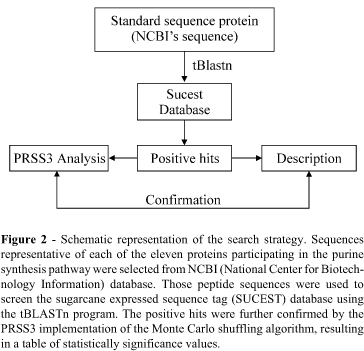Nucleotide synthesis is of central importance to all cells. In most organisms, the purine nucleotides are synthesized de novo from non-nucleotide precursors such as amino acids, ammonia and carbon dioxide. An understanding of the enzymes involved in sugarcane purine synthesis opens the possibility of using these enzymes as targets for chemicals which may be effective in combating phytopathogen. Such an approach has already been applied to several parasites and types of cancer. The strategy described in this paper was applied to identify sugarcane clusters for each step of the de novo purine synthesis pathway. Representative sequences of this pathway were chosen from the National Center for Biotechnology Information (NCBI) database and used to search the translated sugarcane expressed sequence tag (SUCEST) database using the available basic local alignment search tool (BLAST) facility. Retrieved clusters were further tested for the statistical significance of the alignment by an implementation (PRSS3) of the Monte Carlo shuffling algorithm calibrated using known protein sequences of divergent taxa along the phylogenetic tree. The sequences were compared to each other and to the sugarcane clusters selected using BLAST analysis, with the resulting table of p-values indicating the degree of divergence of each enzyme within different taxa and in relation to the sugarcane clusters. The results obtained by this strategy allowed us to identify the sugarcane proteins participating in the purine synthesis pathway.




